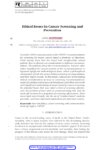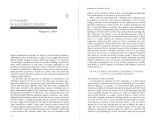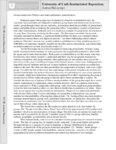|
|
Creator | Title | Description | Subject | Date |
| 51 |
 |
Hanna, Patricia Lee | Equal rights for children (book review) | A review of the book "Equal Rights for Children" by Howard Cohen. | Books, reviews; Equal rights; Children | 1982-04 |
| 52 |
 |
Plutynski, Anya | Ethical issues in cancer screening and prevention | November 2009's announcement of the USPSTF's recommendations for screening for breast cancer raised a firestorm of objections, Chief among them that the Panel bad insufficiently valued patients' lives or allowed cost considerations to influence recommendations. The publicity about the recommendation... | | 2012-01-01 |
| 53 |
 |
Landesman, Bruce M. | Ethical Marxism and its radical critics | Wilde defends what he calls Ethical Marxism. This is a familiar view, which many refer to as Marxist Humanism. According to Wilde, Marx holds that there is a human essence which involves freedom and the development of each individual's creative potential. This is achievable, however, only under cond... | Marxism; Book review | 2000 |
| 54 |
 |
Landesman, Bruce M. | Ethical Marxism and its radical critics (book review) | Reviews the book `Ethical Marxism and Its Radical Critics,' by Lawrence Wilde. | Books; Marxism; Philosophy | 2000-01 |
| 55 |
 |
Battin, Margaret P. | Euthanasia in alzheimer's disease? | Ought euthanasia be practiced for persons with advanced dementia? Although the issue of euthanasia is a topic of increasingly heated social debate, already tending to polarize those who support it as voluntary "aid-in-dying" and those who reject it as medical "killing," what is said about active eut... | | 1933 |
| 56 |
 |
Downes, Stephen M. | Evolution of agency and other essays (book review) | Reviews the book 'The Evolution of Agency and Other Essays,' by Kim Sterelny. | Agent, Philosophy;; Books, nonfiction | 2002-11-13 |
| 57 |
 |
Battin, Margaret P. | Excellent palliative care as the standard, physician-assisted dying as a last resort | To understand the role of physician-assisted death as a last-resort option restricted to dying patients for whom palliative care or hospice has become ineffective or unacceptable, one must understand how frequently and under what circumstances that occurs. If all such cases are the result of inadequ... | | 2004 |
| 58 |
 |
Plutynski, Anya | Explanation in classical population genetics | The recent literature in Philosophy; of biology has drawn attention to the different sorts of explanations proffered in the biological sciences--we have molecular, biomedical, and evolutionary explanations. Do these explanations all have a common structure or relation that they seek to capture? This... | Biology, Philosophy;; Explanation; Genetics; Life sciences; Population genetics; Science | 2005-12 |
| 59 |
 |
Nichols, Shaun | Explicit factuality and comparative evidence. | We argue that Dienes & Perner's (D&P's) proposal needs to specify independent criteria when a subject explicitly represents factuality. This task is complicated by the fact that people typically "tacitly" believe that each of their beliefs is a fact. This problem does not arise for comparative evide... | Philosophy;; Factuality; Dienes & Perner's Proposal | 1999-12-16 |
| 60 |
 |
Crowe, Benjamin D. | F. H. Jacobi on faith, or what it takes to be an irrationalist | F. H. Jacobi (1743-1819), a key figure in the philosophical debates at the close of the eighteenth century in Germany, has long been regarded as an irrationalist for allegedly advocating a blind ‘leap of faith'. The central claim of this essay is that this venerable charge is misplaced. Following... | | 2009-09 |
| 61 |
 |
Battin, Margaret P. | False dichotomy versus genuine choice the argument over physician-assisted dying | Despite a growing consensus that palliative care should be a core part of the treatment offered to all severely ill patients who potentially face death,1 challenging questions remain. How broad a choice should patients have in guiding the course of their own dying? What limitations should be placed ... | | 2004 |
| 62 |
 |
White, Nicholas P. | Forms and sensibles: Phaedo 74B-C | In Phaedo 74b6-c6 Plato offers an important argument for the proposition that such things as "the equal itself," i.e. such things as are often called "Forms," are distinct from sensible objects. The argument is especially important because it is one of a very small number of explicit arguments-perha... | Plato; Forms; Sensibles | 1987 |
| 63 |
 |
Thalos, Mariam G. | From human nature to moral Philosophy | In this essay I've illustrated the effects of exposing the question of the self to empirical scrutiny, showing that it leads to a partial dissolution of the manifest image. And that this, in turn, leads to seeking articulation of the relationship between moral and political Philosophy;, as to whethe... | Self; Empiricism; Moral Philosophy;; Political Philosophy | 2002 |
| 64 |
 |
Thalos, Mariam G. | From paradox to judgment: an essay on the metaphysics of expression | The Liar sentence is a singularly important piece of philosophical evidence. It is an instrument for investigating the metaphysics of expressing truths and falsehoods. And an instrument too for investigating the varieties of conflict that can give rise to paradox. It shall serve as perhaps the most ... | Liar sentence; Metaphysics; Paradox; Human Nature; Truth; Falsehood | 2005 |
| 65 |
 |
Thalos, Mariam G. | From paradox to judgment: towards a metaphysics of expression | The Liar sentence is a singularly important piece of philosophical evidence. It is an instrument for investigating the metaphysics of expressing truths and falsehoods. And an instrument too for investigating the varieties of conflict that can give rise to paradox. It shall serve as perhaps the most ... | Language; Sentences; Semantic | 2005 |
| 66 |
 |
Andreou, Chrisoula | Getting on in a varied world | Are greed and ruthlessness contrary to reason? Is immorality a form of irrationality? Much of contemporary ethical theory is a debate between Kantians, who argue that the dictates of morality are dictates of reason, and Humeans, who argue that reason is neutral between morality and immorality. T... | Kantians; Humeans; Immorality | 2006 |
| 67 |
 |
Kachi, Yukio | Gods, forms, and socratic piety | The recent resurgence in Socratic scholarship has been rather unconcerned with the religious dimension of Socrates' thought. Yet there can be no doubt that there is such a dimension, and that it is significant to his Philosophy;. After all, Socrates was tried and found guilty of impiety. | Socrates; Philosophy;; Divine | 1983 |
| 68 |
 |
Francis, Leslie | Group compromise: perfect cases make problematic generalizations | Rothstein argues that groups may be harmed by research on deidentified data. He concludes that researchers are obligated to minimize group harms and demonstrate respect for a studied group through robust opt-out capacities, information about the possibility of group-based harms, and publications ref... | | 2010-01-01 |
| 69 |
 |
Millgram, Elijah | Harman's hardness arguments | In "Change in View" Gilbert Harman produces arguments of the following pattern: Of two competing methods of belief revision, one is too hard; the other must therefore be the rational method. I will call arguments of this form hardness arguments. Hardness arguments are not, of course, peculiar to Har... | Philosophy;; Rationality; Reason; Cognition | 1991-09 |
| 70 |
 |
Hanna, Patricia Lee | Having children: philosophical and legal reflections on parenthood (Book Review) | A review of the book "Having Children: Philosophical and Legal Reflections on Parenthood". | Books, reviews; Parenthood; Philosophy; Law | 1981-07 |
| 71 |
 |
Landesman, Bruce M. | Health care in a national health program: a fundamental right | Do or should Americans have a right to health care or some appropriate level of it? To explore this difficult and complex question, we must say something about rights and ways to justify them; about considerations which favor a right to health care; about what level and kind of care the right may in... | Health care; Rights; Americans | 1992 |
| 72 |
 |
Crowe, Benjamin D. | Heidegger and the prospect of a phenomenology of prayer | An attempt to contribute to a "phenomenology of prayer" ought to begin with the recognition that the word "phenomenology" means many different things to many different people. Moreover, it must be recognized that none of these usages has any obvious claim to being the normative one. Given these ines... | | 2005 |
| 73 |
 |
Downes, Stephen M. | Herbert Simon's computational models of scientific discovery | Herbert Simon's work on scientific discovery deserves serious attention by philosophers of science for several reasons. First, Simon was an early advocate of rational scientific discovery, contra Popper and logical empiricist philosophers of science (Simon 1966). This proposal spurred on investigati... | Android epistemology; Psychological processes; Cognitive individualism | 1990 |
| 74 |
 |
Downes, Stephen M. | Heredity and heritability | Philosophical discussions of heredity have focused on the sustainability of heritability analyses and more recently on the units of heredity. Here I introduce the concept of heritability and the problems associated with it. Next the units of heredity discussion is introduced. Here I consider alterna... | DNA; Heredity; Heritability | 2004-07-15 |
| 75 |
 |
Battin, Margaret P. | High-risk religion | Among some of the more colorful groups on the American religious spectrum, the religious faith of believers seems to involve a willingness to take substantial physical risks"risks to health, to physical functioning, even the risk of death. These groups include several in which the risks a believer ... | Religion; Physical risk; Choice; Death | 1989 |

























